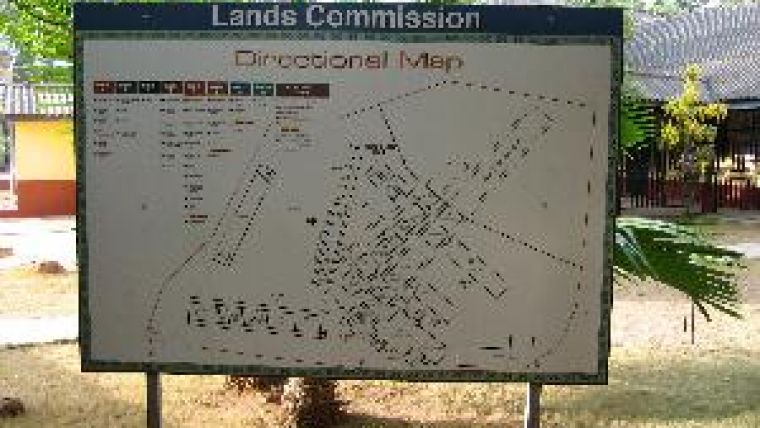Customary Tenure and Good Governance
Implications for Land System Modelling
Although customary tenure institutions come under considerable strain and their functions tend to be weakened by the existence of a statutory institutional framework, many people in peri-urban areas continue to rely on such arrangements for land delivery. These institutions maintain their traditional power and social responsibility for allocating the right to use land, resolve conflicts, and carry out overall management of customary land. Yet little attention has been paid to whether or not the activities of these indigenous institutions meet good governance objectives in land administration. The issue has been studied in Ghana.
Despite much colonial legislative influence, customary authorities continue to play a prominent role in many parts of Africa. Customary tenure institutions administer virtually all the land in these areas, even where demand for land transactions and more formal property rights are rapidly increasing. The superimposition of state management institutions has stunted customary tenure institutions and disabled them in effectively managing their land. Consequently, these institutions have not been able to evolve to the extent that they can cope with the speed, volume, diversity and complexity of land management issues in peri-urban areas. As customary land transactions become increasingly monetised, important issues are raised of effectiveness, equity and accountability. Customary land delivery activities are marked by abuse of power; land grabbing, conflicts, evictions, tenure insecurity and lack of accountability of stewardship. Since customary tenure institutions are at the entry point of both customary and statutory land-delivery processes, it is appropriate to extend good governance assessment in Land Administration (LA) to the customary tenure institutions.
Good Governance
In recent times LA activities have been associated with bribery and corruption, especially in the developing world. Weak governance has also been linked to lack of comprehensive regulatory framework governing security of tenure, insufficient or incoherent and improperly enforced legal provisions, lack of transparency and access to information, inequity and unfairness, lack of accountability, irresponsiveness of institutions to the plight of land users, and an inability for citizens to participate in land governance. Slow and bureaucratic procedures and high-cost services make LA institutions and judicial services accessible only to the rich in society. Since LA aims to improve tenure security it is important that administering institutions promote good governance principles; the aim must be to protect property rights of individuals and groups, particularly vulnerable groups such as the poor, women and indigenous farmers.
‘Blended’ Systems
Three representative customary areas in Ghana were selected as case-studies to provide empirical evidence highlighting key governance issues in institutional arrangements for customary land delivery. The tenure systems of the study areas blend elements of customary systems with statutory systems. In other words, users gain access to land through a blend of ‘customary’ and ‘statutory’ arrangements; access to customary land is governed by customary and statutory laws and controlled by both statutory and customary institutions. The study focused on efficiency and effectiveness, accountability, participation, transparency and equity as essential to any complete assessment of the customary tenure institutions.
Clear and Simple
Efficient customary land delivery requires that procedures for land allocation and dispute resolution follow due process as defined by customary law. Customary tenure institutions need to develop new ways to record and maintain land information that ensures improved service delivery within a reasonable time. Procedures for land allocation and conflict resolution should be
clear and simple. Effective customary land delivery ensures that the
rights of all groups and stakeholders in landholding groups are respected and protected. Effectiveness also depends on the use of competent persons to control every aspect of land delivery processes so as to produce accurate work. It requires well enforced customary laws and regulations in land tenure and justice delivery. It is also required that customary institutions enforce and respect both community decisions and those taken to resolve land conflicts. Effective customary delivery relies on professional advice from the statutory institutions and other professional bodies. Surveyors can play a key role here.
Broad Accessibility
Institutions that have been entrusted with keeping information on customary land should be accessible to community members and other users of land information. Inaccessibility of institutions and land information leads to abuse of power and corruption. Information on all land allocations and use of land resources must be accessible to all people and statutory agencies. Customary tenure institutions should put in place mechanisms for recording and maintaining land information, and information desks. Procedures for acquiring land must be clear and open to all stakeholders. Chiefs and land-allocation committees should not take any unilateral decision concerning land acquisition, occupation and use of land. Decisions on how land is allocated and used in the community must be made at meetings open to all stakeholders. Community members should be allowed to present their views. Clarity of customary laws can improve transparency.
Full Accountability
Customary authorities must report regularly on what they have been entrusted to do, by responding to questioning, explaining actions and providing evidence of their functions. A proper accounting system and record-keeping in land-delivery processes are much desired. Specifically, institutions must regularly publish accounts on land sales/leasing or any allocation. They must also subject themselves to periodic checks by making their records available for external auditing. These measures will not only prevent corruption and abuse of power by customary authorities who enrich themselves from community resources, but can be seen as a basic step in commanding confidence and trust over stewardship of resources placed under their care.
Equity and Fairness
Customary tenure institutions are expected to deal fairly and impartially with community members and settlers by providing non-discriminatory access to land, information and justice delivery. The indicators address how the needs of all interest groups – sub-families and members constituting the landowning group – are considered both in the land allocation process and in distribution of proceeds accrued from land resources. Specifically, when compensation has been paid to land losers, all affected persons must be treated fairly. In addition, customary tenure institutions must put in place measures that ensure tenure security for women, other vulnerable groups and future generations.
Representing All
Participation requires that all family groups constituting the landowning group must be represented in the various divisions of the customary tenure institutions that take decisions on the use of communal land. In particular, the committees in charge of land allocation and decision-making must be instituted in such a way as to cut across the various family and gender groups, and settlers. Customary tenure institutions must also allow community members to participate fully in land governance through consensus building. In addition, professional institutions should be consulted when necessary to provide advice. Participation leads to improved accountability, reduction in conflicts, more flexible and efficient management and increased legitimacy; it also implies better use of place-specific knowledge etc.
Concluding Remarks
Measures of efficiency and effectiveness, equity, accountability of stewardship, participation of community members in land-management activities and decision-making, transparency and accessibility are essential to any complete assessment of good governance in customary tenure institutions. These five dimensions of good governance, elaborated into several operational indicators, are interrelated and cannot stand alone. For example, when structures that have been sustaining transparency and participation in customary tenure institutions are properly in place, accountability is improved. This also leads to further efficiency and effectiveness of decision making, and higher tenure security for all persons. Therefore the indicators should not be taken as individual factors, but efforts made to touch on all if the aim is to achieve good governance in customary land delivery. Statutory institutions could provide the necessary guidelines for regulation of customary institution activities to ensure that they adhere to the principles of good land governance. A regulative framework that enforces more accountability within customary tenure institutions, in particular a rule making them submit financial statements for external auditing, is much desired. If indigenous knowledge and the capacity of customary tenure institutions could be enhanced, land governance in such areas might be improved. There is therefore a need to look for appropriate tools for enhancing indigenous knowledge and improving local community capacities to take inventory of land tenure information.
Further Reading
- FAO (2007); Good Governance in Land Tenure and Administration. FAO Land Tenure Studies. 9.
- FIG (2004); Secure Land Tenure: New Legal Frameworks and Tools. Proceedings of an expert meeting held by Commission 7, Nairobi, Kenya, UN-Gigiri.
- Toulmin, C. (2009); Securing Land and Property Rights in Sub-Saharan Africa: The role of Local Institutions. Land Use Policy 26(1): 10-19.
- UN-HABITAT (2007); Transparency in Land Administration: A Capacity Building Agenda for Africa. Expert Group Meeting on Transparency in Land Administration, Nairobi, Kenya, UN-HABITAT.
- Zimmermann, W. (2006); Good Governance in Land Administration. Shaping the Change, XXIII FIG Congress. Munich, Germany.

Value staying current with geomatics?
Stay on the map with our expertly curated newsletters.
We provide educational insights, industry updates, and inspiring stories to help you learn, grow, and reach your full potential in your field. Don't miss out - subscribe today and ensure you're always informed, educated, and inspired.
Choose your newsletter(s)
























